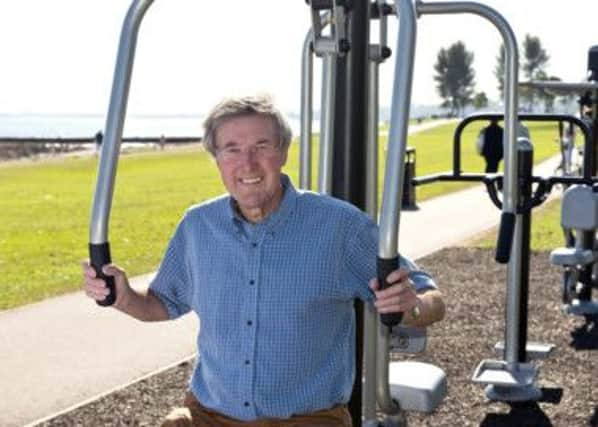Carrick man backs PHA cancer awareness campaign


Captain Robert Gray was shocked to discover he had an aggressive form of prostate cancer despite his healthy and active lifestyle.
His story comes as the Public Health Agency (PHA) launched its ‘Be Cancer Aware’ campaign, which highlights how important it is to know what to look out for and to get yourself checked if you notice anything which could point towards cancer.
Advertisement
Hide AdAdvertisement
Hide AdRobert said: “I have spent over 50 years as a seafarer dealing with all sorts of difficulties, but when I was told I had prostate cancer and it was an aggressive sort, I felt I was in a worse predicament than the captain of the Titanic. I had no control over what was happening and this was a totally new experience for me.
“It had all started with a phone call from an old shipmate. I had a slight need to pass water more frequently, which I thought was part of growing old and had not realised was a symptom. My friend mentioned in conversation that he’d had a Prostate-Specific Antigen (PSA) Test. I hadn’t a clue what this was, so he explained that the test measures the blood level of PSA, a protein that is produced by the prostate gland. A raised PSA can indicate an infection or enlarged prostate, but also the presence of prostate cancer.
“A couple of weeks later, I went to the GP and had a blood test for PSA and was surprised when my doctor phoned the next morning with the result. I then had a biopsy three weeks later.
“When the diagnosis was given, I was shocked. I was 67 at the time but in good shape. I attended the gym three times a week, walked and played golf – how could this happen to me? My wife and I felt the earth had moved and sat in shocked silence while listening to what the urologist had to say. I would start hormone therapy immediately and have a CT scan and MRI scan to see if the cancer had spread.
Advertisement
Hide AdAdvertisement
Hide Ad“During that time I feared the worst – that the cancer had spread. The wait for the results seemed like forever. So when the doctor told us that the scans had shown no cancer outside the prostate, I was overjoyed.
“Things were looking better. I was told that I’d continue the hormone therapy for about two and a half years and I would be given about seven and a half weeks of radiotherapy.
“My treatment finished in March 2013 and I am now reviewed every six months. I’m fine now and have always felt OK. The radiotherapy wasn’t as bad as I thought it would have been and I was able to continue to go to the gym and play golf.
“Now I take each day as it comes and appreciate my wife, three children and five grandchildren all the more. I would urge anyone who is concerned about their symptoms to go and see their GP as soon as possible. It is better to know what you are dealing with and then you can face it head on.”
Advertisement
Hide AdAdvertisement
Hide AdDr Miriam McCarthy, consultant in Public Health Medicine at the PHA, said: “There are over 10,000 new cancer diagnoses each year in Northern Ireland. With advances in treatment and care over recent years, there is often a lot that can be done to tackle cancer when it appears, but early detection and treatment are essential.
“Survival rates in Northern Ireland for some cancers fall below what is achieved elsewhere in the UK and Europe. Some of this may be due to low levels of awareness of cancer symptoms and a reluctance to talk to a GP at an early stage.
“A survey undertaken on behalf of the PHA revealed that barriers to seeking help in relation to cancer symptoms include being worried about what the doctor might find and embarrassment. We are urging people to set these concerns aside and speak to their GP if they have any signs or symptoms.
“Finding cancer early and getting it treated can really make the difference and greatly improve the likelihood of survival.
“It is therefore vital for all of us to be cancer aware, to know the signs and symptoms of cancer, and to speak to a GP if we experience any of them.”